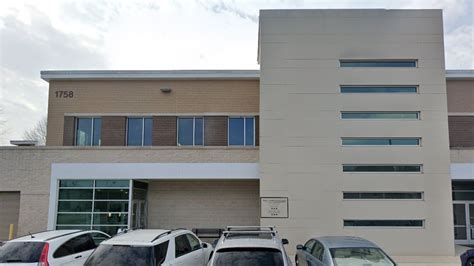Alabama Health Department

The Alabama Department of Public Health (ADPH) is a state agency responsible for protecting and promoting the health and well-being of Alabama's residents. With a rich history dating back to 1875, the ADPH has evolved to address the changing health needs of the state's population. The department's mission is to prevent illness and injury, promote healthy behaviors, and protect the environment to ensure a healthy Alabama.
Organization and Structure

The ADPH is organized into several bureaus and divisions, each focusing on specific areas of public health. These include the Bureau of Family Health, Bureau of Health Provider Standards, Bureau of Clinical Laboratories, and the Division of Emergency Medical Services, among others. This structure enables the department to address a wide range of health issues, from infectious diseases and environmental health to maternal and child health and emergency preparedness.
Bureau of Family Health
The Bureau of Family Health is responsible for programs and services aimed at promoting healthy behaviors and preventing illness among Alabama’s families. This includes initiatives such as the Women, Infants, and Children (WIC) program, which provides nutrition assistance to low-income pregnant and postpartum women, infants, and young children. The bureau also oversees the Alabama Breast and Cervical Cancer Early Detection Program, which offers free breast and cervical cancer screenings to eligible women.
| Program | Description |
|---|---|
| WIC Program | Nutrition assistance for low-income pregnant and postpartum women, infants, and young children |
| Alabama Breast and Cervical Cancer Early Detection Program | Free breast and cervical cancer screenings for eligible women |

Health Initiatives and Programs

The ADPH implements various health initiatives and programs to address specific health concerns in Alabama. For example, the department’s Tobacco Prevention and Control Program aims to reduce tobacco use among youth and adults through education, community-based initiatives, and policy development. The ADPH also oversees the Alabama Newborn Screening Program, which tests newborns for certain genetic disorders and other conditions.
Tobacco Prevention and Control Program
The Tobacco Prevention and Control Program is a comprehensive initiative that includes public education campaigns, community-based programs, and policy development to reduce tobacco use in Alabama. The program also provides resources and support for tobacco cessation, including nicotine replacement therapy and counseling.
Key Points
- The ADPH is responsible for protecting and promoting the health and well-being of Alabama's residents.
- The department's mission is to prevent illness and injury, promote healthy behaviors, and protect the environment.
- The ADPH is organized into several bureaus and divisions, each focusing on specific areas of public health.
- The department implements various health initiatives and programs to address specific health concerns in Alabama.
- The ADPH's family health programs are crucial in addressing health disparities and promoting health equity in Alabama.
The ADPH also plays a critical role in emergency preparedness and response, working closely with local health departments, hospitals, and other partners to prepare for and respond to public health emergencies such as natural disasters, infectious disease outbreaks, and bioterrorism threats. The department's emergency preparedness efforts include developing and implementing emergency response plans, conducting drills and exercises, and providing training and education to healthcare professionals and other stakeholders.
Emergency Preparedness and Response
The ADPH’s emergency preparedness and response efforts are guided by the department’s Emergency Operations Plan, which outlines the roles and responsibilities of ADPH staff and partners during public health emergencies. The plan also identifies the department’s emergency response priorities, including protecting the public’s health, preventing illness and injury, and minimizing the impact of emergencies on communities.
Emergency Response Priorities
The ADPH’s emergency response priorities include protecting the public’s health, preventing illness and injury, and minimizing the impact of emergencies on communities. The department achieves these priorities through a range of activities, including monitoring disease outbreaks, providing emergency medical services, and coordinating with local health departments and other partners to respond to emergencies.
| Priority | Description |
|---|---|
| Protecting the public's health | Preventing the spread of disease, promoting healthy behaviors, and protecting the environment |
| Preventing illness and injury | Identifying and mitigating health risks, providing emergency medical services, and promoting healthy behaviors |
| Minimizing the impact of emergencies | Coordinating with local health departments and other partners, providing resources and support, and promoting community resilience |
What is the mission of the Alabama Department of Public Health?
+The mission of the ADPH is to prevent illness and injury, promote healthy behaviors, and protect the environment to ensure a healthy Alabama.
What programs and services does the Bureau of Family Health offer?
+The Bureau of Family Health offers programs and services such as the WIC program, the Alabama Breast and Cervical Cancer Early Detection Program, and other initiatives aimed at promoting healthy behaviors and preventing illness among Alabama's families.
What is the role of the ADPH in emergency preparedness and response?
+The ADPH plays a critical role in emergency preparedness and response, working closely with local health departments, hospitals, and other partners to prepare for and respond to public health emergencies.
In conclusion, the Alabama Department of Public Health plays a vital role in protecting and promoting the health and well-being of Alabama’s residents. Through its various programs and services, the department addresses a wide range of health issues, from infectious diseases and environmental health to maternal and child health and emergency preparedness. By working closely with local health departments, hospitals, and other partners, the ADPH is able to respond effectively to public health emergencies and promote healthy behaviors among Alabama’s families and communities.



